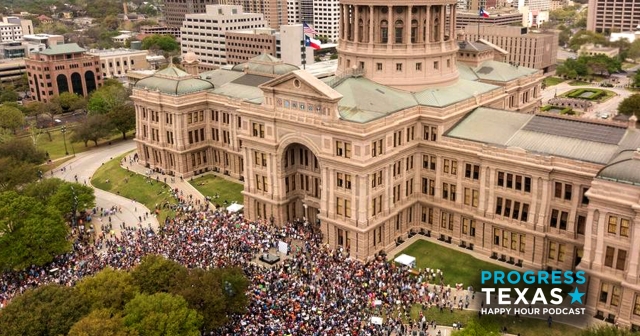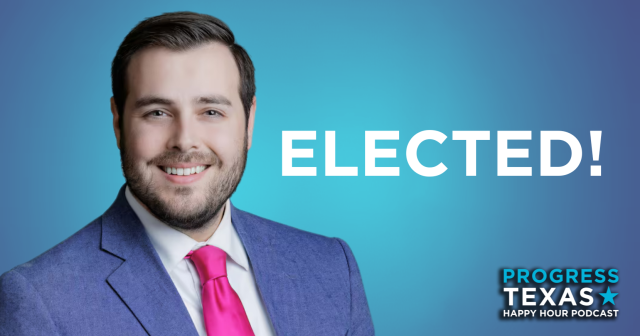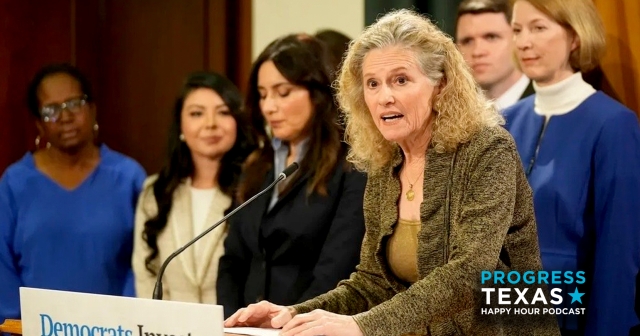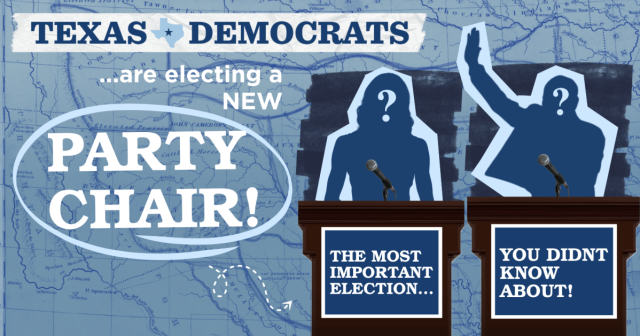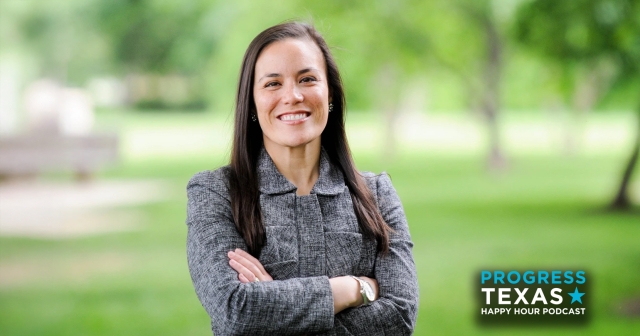Investing in Our Future - The State of the State in Texas
Today, Governor Rick Perry gives his 7th State of the State address. We thought this would be the perfect opportunity to catch up on what is going on in the Texas Legislature, brief you on the latest news on the major issues, and point you towards resources where you can learn more. Hopefully, this will give you a better starting point for learning about some of the major issues facing the 83rd Texas Legislature.
If there is an issue area you would like to learn more about, or more information on the topics below you believe should be included, please do not hesitate to e-mail me and let me know. You can reach me at phillip-at-progresstexas.org, or leave a comment below.
Below you will find information on the following topics - clicking on the links take you straight to that issue:
- Budget & Taxes: Investing in Our Future
- Expanding Medicaid: 231,000 Jobs by 2016
- The Battle to Save Public Schools
- Family Planning Cuts Run Deep
- Water for a Rainy Day
- LGBT & the Fight for Equality
- The Voting Rights Act Still Matters
Budget & Taxes: Investing in Our Future
ACTION: Sign the Texas Forward petition to invest in a balanced state budget!
Only those who have opportunities to pursue their dreams are truly free. For over a decade, the Texas Legislature has denied freedom to people across Texas - the freedom to learn, the freedom to live, and the freedom to invest in better lives for our families. A smart budget invests in our future and future generations, creating jobs and a sustainable economy for our children and grandchildren. When it comes to our budget and our taxes, we should ensure the same rules apply to everyone.
Unfortunately, Rick Perry’s budget seriously damages Texas’ ability to create jobs because it relies so heavily on cutting vital services that help build a strong economy. Here's a look at how some of our tax dollars are used for out-of-date tax expenditures. The graph is courtesy of Texas Forward, a coalition of nonprofits that advocate for public investments that improve people's lives:
[[{"fid":"1616","view_mode":"default","fields":{"format":"default","field_file_image_alt_text[und][0][value]":"Texas Forward Chart","field_file_image_title_text[und][0][value]":"","field_folder[und]":"906"},"type":"media","attributes":{"alt":"Texas Forward Chart","height":"430","width":"706","style":"width: 550px; height: 335px;","class":"media-element file-default center"}}]]
- The Center on Public Policy Priorities has a tremendous interactive website that lets you calculate the impact the budget has on Texas families
- Historically, billions in tax dollars raised for a dedicated purpose are not used for that purpose - for example, the sportings goods tax doesn't go to state parks as intended, but is swept into the pot of money legislators use for other purposes. The Texas Legislature is trying to change that pattern, but has yet to determine how to fill the budget hole that would be left from such a move.
- Some are concerned tapping the Rainy Day Fund could push Texas past it's spending cap; Rep. Donna Howard has filed legislation to address this potential and complicated issue
- The current budget cuts to state parks would result in 7 state parks closing
ACTION: Sign our petition to Texas lawmakers and tell them you want to expand Medicaid now!
Texas has more than 6.3 million uninsured. 1 in 4 Texans lack health insurance, the most of any state. The Supreme Court's declaration in late June 2012 that the Affordable Care Act is constitutional was rightfully celebrated across the country - and here in Texas - for the impact the law will have making health care more accessible and affordable to all Texans. However, the ruling left one crucial wrinkle - it is now up to individual states to expand Medicaid, a core concept of the law which would dramatically improve Texas' health care coverage.
Medicaid expansion would contribute $6 billion in the next four years to the Texas economy and provide as many as 1.5 million Texans health insurance. A new study from Texas Impact, completed by the former Texas Deputy Comptroller of Public Accounts, suggests that the economic activity generated from expanding Medicaid would create 231,000 jobs by 2016. Therefore, it seems strange that anyone would oppose the law - until you remember that Governor Rick Perry will oppose anything President Obama does (as will Senator Ted Cruz, for that matter). However, Governor Perry is facing an uphill battle - as a December poll of 944 Texans conducted by the American Cancer Society shows, 58% of Texans support expanding Medicaid, while only 30% oppose:
[[{"fid":"1617","view_mode":"default","fields":{"format":"default","field_file_image_alt_text[und][0][value]":"","field_file_image_title_text[und][0][value]":"","field_folder[und]":"906"},"type":"media","attributes":{"height":"378","width":"549","style":"width: 549px; height: 378px;","class":"media-element file-default center"}}]]
Of course, another key component of the law - establishing a health care exchange that allows Texas consumers to easily shop for better health care coverage - is also currently being blocked by Governor Perry. Hopefully, if enough momentum pushes the expansion of Medicaid in Texas, the exchange will be picked up, too.
There is a chance that Texas will, ultimately, expand Medicaid. It would be a major boost to our economy, it would expand coverage to millions of Texans, and it is popular among voters. Texas State Senator Jane Nelson (R-Flower Mound), the Chair of the Texas Senate's Health and Human Services Commission, has suggested that there could very well be a pathway forward on Medicaid expansion as recently as last week. The overwhelming common sense of expanding Medicaid will, hopefully, trump Governor Perry's politics in the end.
Below are some helpful resources where you can learn more about Medicaid expansion, and how essential it is to the future of our state:
- Texas Well & Healthy is a tremendous coalition group devoted to improving health care in Texas. Texas Well & Healthy has partnered with Progress Texas on numerous projects for the Affordable Care Act, and continues to be an invaluable source for health care news and grassroots-action opportunities.
- The Texas Tribune's Tribpedia on Medicaid and interactive that weighs Medicaid expansion are very useful tools for learning more.
- "Smart, Affordable and Fair: Why Texas Should Extend Medicaid Coverage to Low-Income Adults" - this brand new report from Texas impacts analyzes the impact expanding Medicaid would have on Texas families and Texas' economy.
- "Only One Rationale Choice: Texas Should Participate in Medicaid Expansion Under the Affordable Care Act" - a recent report by noted Texas economist Dr. Ray Perryman details the positive economic and health care impacts of expanding Medicaid.
- Here's a link to the American Cancer Society's poll that shows that 58% of Texans favor expanding Medicaid.
The Battle to Save Public Schools
School finance. Student testing. Privatization and vouchers. The battle to save Texas public schools will be fought on many fronts in the coming years, as conservatives continue their efforts to underfund and undercut the future workforce of Texas.
School Finance
In the time since Perry issued his first State of the State, the percentage of students that were economically disadvantaged (43.7%) grew at twice the rate of overall population growth (20%). In 2010, 40% of Hispanics did not have a high school degree, compared with only 8% of Anglos. The state's refusal to adequately and equitably fund Texas public schools has created a second-class tier of public education that disproportionately affects poor and minority students who live in areas where property taxes don't cover the cost of a quality education.
[[{"fid":"1618","view_mode":"default","fields":{"format":"default","field_file_image_alt_text[und][0][value]":"","field_file_image_title_text[und][0][value]":"","field_folder[und]":"906"},"type":"media","attributes":{"height":"426","width":"510","style":"width: 510px; height: 426px;","class":"media-element file-default center"}}]]
Despite this obvious correlation, Governor Rick Perry recently pronounced Texas' education funding as "phenomenal" - a boast that quickly earned him a "False" rating from Politifact Texas. Given that Texas schools are already running $1 billion short, according to TEA’s Chief Financial Officer, it is surprising what little urgency is being given to addressing Texas' critical school finance problems. Rumors at the Texas Capitol are that Republican lawmakers are going to wait until after the 2014 primaries to call a special session on school finance - choosing to prioritize winning their Tea Party primaries over investing in our children's future. In the mean time, the state's school finance trial continues at the same time the new TEA Commissioner recommends no action on school finance until after the court case is complete.
With the school finance trial looming in the background, the Texas Legislature is also considering how to move forward on two major ideas: testing students, and privatizing schools.
Testing
The question of student testing has boiled over in recent years, embodied by an expensive contract the state of Texas has with Pearson, a private company that writes tests for Texas public schools and currently is in the middle of a $468 million, 5-year contract with the state. During a back and forth with the Senate Finance Committee, Texas Education Agency (TEA) Commissioner Michael Willims disclosed that approximately 8 million tests were administered in the last year. TEA has information on the testing and new accountability system here; it is expected that Commissioner Williams will make an announcement on testing in March 2013.
Senator Ken Seliger, Chair of the Senate Higher Education Committee, has filed Senate Bill 225, which dramatically revamps the way testing is done. From the Associated Press:
Seliger...wants to scrap requirements that students take four years each of math, science, English and social studies. Instead, students would take four credits in English, three in math and social studies, and two in science and foreign language under a new system Seliger called the Foundation High School Program.
The math requirements would encompass algebra I, geometry and algebra II in most cases, while mandated science classes would be biology and, usually, integrated physics or chemistry. The social studies courses would include U.S. history, a half credit of U.S. government, a half credit of economics, and a world history or world geography class, or appropriate substitute approved by state officials. Students would also have to take a fine arts credit and one in physical education — as well as 10 elective credits.
Instead of 15 exams in core subjects, students would need to pass five tests in reading and writing, algebra I, U.S. history, and biology. The measure would let school boards around Texas decide whether those tests would count toward anything besides graduation. Currently, high school students are required to pass up to 15 exams as part of [STAAR] which began being administered last school year and which replaced a previous statewide testing system known as TAKS.
At the same time, Representative Mike Villarreal filed House Bill 556, which limits how much time schools can spend on testing and removes the controversial requirement that tests count for 15% of a student's final grade.
School Privatization Efforts
State Senator Dan Patrick has worked hard to promote school privatization efforts in Texas. Senator Patrick has repeatedly called this the "civil rights issue of our time" - attempting to hide the fact this his push for privatization is nothing more than a get-rich-quick scheme for businesses hoping to profit off of taxpayer dollars that should go to public schools. The Center for Media and Democracy's ALEC Exposed has numerous excellent resources that detail the privatization scheme; one example of the privatization plans is an effort to expand virtual schools. Progress Texas published a reportt about public schools in Texas last May and testified before the Senate Education committee warning about their perils. From the report:
Estimates show that revenues from the K-12 online learning industry will grow by 43 percent between 2010 and 2015, with revenues reaching $24.4 billion. More than 200,000 K-12 students are enrolled in full-time virtual schools across the country; when expanded to all students enrolled in at least onecourse, the number explodes to 2,000,000. The more children enrolled in virtual schools, the greater the profit for the companies...
A recent study by Stanford University’s Center for Research on Education Outcomes found that 100% of virtual schools in Pennsylvania performed significantly worse than traditional public schools in reading and math. Over half the students at Ohio Virtual Academy dropped out by the end of the 2010-2011 school year.
Sen. Patrick's ideas for privatization appeared to have some real momentum when first introduced. Yet months later, Sen. Patrick has taken to recruiting outside groups to help sell his idea, perhaps tipping his hand at just how unpopular his effort to privatize public schools really is. Few around the Capitol believe a school choice program would be in place this session - but if all legislators won't come back until after the 2014 primaries anyway, Senator Patrick still has a lot of time and a lot of political power to push for his way.
Further Resources:
- The Texas Tribune's Tribpedia on School Finance provides an excellent primer on the issue
- Texas ISD compiles daily news clips on all education issues, if you want to keep up with them each dayl
- The Texas American Federation of Teachers (Texas AFT) and the Texas State Teachers Association (TSTA) are great resources for all issues about education
- Progress Texas' report on virtual schools: "Invisible Schools, Invisible Success"
The Texas Legislature's attacks on women's health care in recent years reached a peak in 2011 when the state slashed $73 million from the family planning budget - two-thirds of all the funds. The result's have been detailed by the Texas Tribune:
The latest Health and Human Services Commission projections being circulated among Texas lawmakers indicate that during the 2014-15 biennium poor women will deliver an estimated 23,760 more babies than they would have as a result of their reduced access to state-subsidized birth control. The additional cost to taxpayers is expected to be as much as $273 million — $103 million to $108 million to the state’s general revenue budget alone — and the bulk of it is the cost of caring for those infants under Medicaid.
In 2011, the money was mostly redirected to Texas' crisis pregnancy centers. The Texas Observer broke down the costs of the crisis pregnancy centers and found, after open records requests and months of digging, that the state is not only creating a less healthy Texas with their family planning budgeting - the state is also losing money:
The bottom line is that the network’s crisis pregnancy centers spent significantly more public money on each client than family planning clinics while delivering fewer services. Altogether, the Texas Pregnancy Care Network costs the state an average of $237 per client. By contrast, the average client at one of the family-planning clinics in Abilene—since defunded and disregarded by lawmakers—had cost $160.
At the same time cuts to the state's family planning budget have gone on, the state of Texas has successfully - at least for now - removed Planned Parenthood as a provider from the Women's Health Program. Now many lawmakers are questioning whether or not enough providers exist - especially after a recent Dallas Morning News investigation:
The state has touted that it found plenty of doctors for its new program now that it has eliminated Planned Parenthood, which had provided annual exams and family planning services to almost half of the 110,000 women enrolled in the federal Medicaid Women’s Health Program. State Republican leaders want the group excluded because its affiliates provide abortions in separate, privately funded facilities.
But a Dallas Morning News survey of 336 contacts listed online for the program showed that 18 percent of the 55 unrepeated physicians and offices surveyed knew they were a part of the program and are accepting new patients. Two listings point people to businesses with no connection to the program — a sports medicine clinic and a title company.
The Texas Tribune has an interactive map of all Women's Health Program providers. To hear an excellent conversation on the issue, watch the Triblive interview with State Reps. Donna Howard and Sarah Davis. Further resources are below:
- NARAL Pro-Choice Texas, an active organization that lobbies the Texas Legislature on women's health issues, has a legislative bill tracker that follows pro-choice and anti-choice legislation.
- Planned Parenthood's website has links to many terrific resources about how to get involved and stay informed on the issue.
- The Texas Observer's powerful, powerful story - "Pregnant? Scared? Can They Help?" - is an absolute must-read.
- The Texas Tribune Tribpedia on the Women's Health Program and their interactive graphic examining where providers are located in Texas are both excellent resources.
In 2011, Texas suffered its worst drought in history - leading to economic losses of $13 billion in our state’s agriculture, cotton, and cattle sectors. Could anything have been done to mitigate the devastating impact of the draught?
Every five years, the state of Texas develops a water plan. The Texas Water Development Board, the official state entity in charge of developing the plan, combines 16 regional water plans from across the state that address the full range of water user groups (municipal, irrigation, manufacturing, livestock, etc.). The result is a $53 billion water plan that is fully detailed in an accessible and admirably understable 300-page report.
There are endless ways to quantify Texas' water shortage and what we're up against if we don't start investing in our future and the public infrastructure necessary to protect our state's water resources for our children and grandchildren. The graph below - taken from the state water plan PDF document - paints the simplest picture:
[[{"fid":"1619","view_mode":"default","fields":{"format":"default","field_file_image_alt_text[und][0][value]":"","field_file_image_title_text[und][0][value]":"","field_folder[und]":"906"},"type":"media","attributes":{"height":"481","width":"509","style":"width: 509px; height: 481px;","class":"media-element file-default center"}}]]
We are going to need more water than we have. The challenge is that the methods for securing the water for Texas' counties and industries requires not one or two, or even ten or twelve, solutions. The state water plan has identified 562 unique water supply projects that must be met. It appears to be a challenge that cannot be easily met - but it is one Texans cannot fail to meet.
That being said...there is concern that reluctance to invest in what is truly needed for our state is preventing Texas from achieving the goals detailed by the water plan. For example, legislation proposed so far by Senator Troy Fraser and Representative Allan Ritter - the Natural Resources Chairmen of their respective chambers - falls short of meeting Texas' needed conservation goals. To that end, lawmakers are proposing better ways to conserve water and encourage water conservation. Environment Texas has laid out a number of conservation targets as well.
In the 83rd Texas Legislature, Rep. Ritter has called for $2 billion in the state's Rainy Day Fund to be used to start financing the most urgent capital projects in the state's water plan. He argues that, at a minimum, that is what lawmakers must invest to get us started down the right path. The Texas Tribune wrote about Rep. Ritter's legislation, and State Impact wrote about where the money would go.
As lawmakers determine what to do with the state water plan, other challenges remain. How Texas uses water to generate electricity remains a challenge that few - including Rep. Ritter - are willing to tackle; I asked him about it myself at a recent public event, and the Chairman ducked the question. The development of natural gas, in particiular, is a potentially very wasteful use of water. The use of water for hydraulic fracturing increased 125% from 2008 to 2011, a major concern for rural counties, where mining (mostly hydraulic fracturing) can account for up to 50% of the water use. At the same time, some in rural Texas are turning to private companies to get their water, with reports of private companies passing on double-digit or even triple-digit water rate hikes to those consumers.
Further resources on water:
- Here is the full 300-page Texas 2012 State Water Plan; additional state resources can be found at the Texas Water Development Board.
- State Impact has created an exceptional site dedicated to the Texas draught.
- The Texas Tribune has a slew of great resources: their Tribpedia on water supply, an interactive to track Texas' reservoir levels and another that compares the cost of water, and they recently had an extended interview with Chairman Ritter, which you can watch online.
- The Lone Star Chapter of the Texas Sierra Club has an entire website dedicated to learning more about water and what can be done to help.
"Our journey is not complete until our gay brothers and sisters are treated like anyone else under the law -- for if we are truly created equal, then surely the love we commit to one another must be equal as well." - President Barack Obama's Second Inaugural Address, January 21, 2013
Despite tremendous national progress on the issue of equality in recent years, the state of Texas remains far behind. The map below, courtesy of the Human Rights Campaign, paints the picture:
[[{"fid":"1620","view_mode":"default","fields":{"format":"default","field_file_image_alt_text[und][0][value]":"","field_file_image_title_text[und][0][value]":"","field_folder[und]":"906"},"type":"media","attributes":{"height":"303","width":"455","style":"width: 455px; height: 303px;","class":"media-element file-default center"}}]]
Despite Texas' 2005 constitutional ban on gay marriage, the state is evolving. 69% of voters support some form of a legal partnership, though 58% still remain against same-sex marriage (as of October 2012). Leading the fight here at home, Equality Texas has identified three major pieces of legislation so far that they are advocating strongly for in the Texas Legislature:
- SB 73 by Sen. Rodney Ellis and HB 226 by Rep. Senfronia Thompson would prohibit insurance companies from denying insurance coverage because of a person's sexual orientation or gender identity/expression. Equality Texas has provided fact sheets for both SB 73 and HB 226 to learn more.
- HB 201 by Rep. Rafael Anchia allows the names of two same-sex parents to appear on their adopted child's birth certificate. The law has stated support from Republican State Senator John Carona, and is a common sense law that would help families and children. The Texas Tribune has also covered the issue, and Equality Texas has a fact sheet on the bill here.
- HB 238 by Rep. Mike Villarreal is an employee non-discrimination bill, which would ban discrimination against an employee on the basis of a person's sexual orientation or gender identity/expression. A statewide poll found that 75% of Texans support this law. As Equality Texas notes in their fact sheet, "Over 90% of the Fortune 500 Companies ban discrimination based upon sexual orientation. 40% prohibit such discrimination based upon gender identity/expression." The Texas Tribune and San Antonio Current have more on this bill.
The Voting Rights Act Still Matters
On February 27, 2013, the United States Supreme Court will hear arguments on the constitutionality of the Voting Rights Act. The Act, one of the greatest achievements of the Civil Rights movement in America, protects against unlawful infringement of a person's right to vote - particularly in Southern states, where historical Jim Crow policies have given way to voter ID laws and obscene redistricting schemes. New name, same intent.
In July of 2006, Congress reauthorized the Voting Rights Act for another 25 years - the fifth renewal of the VRA since its passage. However, Republican state Attorneys General like Texas' own Greg Abbott lost voter ID and redistricting cases recently. Running out of ways to rig elections they cannot win with the power of their own ideas, Abbott and others across the country have set their sights on dismantling necessary protections of Texans' right to vote. In particular, conservatives are targeting Section 5 and Section 203 of the Voting Rights Act, which creates special protections for voters who live in areas of the country with historical (and, in Texas' case, very recent) cases of discrimination.

When federal courts struck down Texas' redistricting and voter ID laws last summer, they left no doubt of their feelings for the laws:
- "A deliberate, race-conscious method to manipulate not simply the Democratic vote but, more specifically, the Hispanic vote." (Redistricting)
- “Record evidence suggests that SB 14, if implemented, would in fact have a retrogressive effect on Hispanic and African American voters.” (Voter ID)
- “We are also persuaded by the totality of the evidence that the plan was enacted with discriminatory intent.” (Redistricting)
- "A law that forces poorer citizens to choose between their wages and their franchise unquestionably denies or abridges their right to vote" (Voter ID)
There is no greater right in a democracy than the right to vote, and that right should be protected and defended for generations to come. That right is up to the judgment of 9 Justices for the five months from February to June when the Supreme Court considers the case. In the mean time, the State of Texas will continue to examine laws that change how Texas elections work - and wait to see what the Supreme Court says come June.
Further resources on the Voting Rights Act include:
- The New York Times did a strong, very informative primer on the challenge of the Voting Rights Act
- Michael Li's redistricting and election law blog is probably the best place in Texas to keep up with all the legal maneuverings of the challenge to the Voting Rights Act
- Pro Publica has an excellent, exhaustive page on voter ID laws
- MALDEF's page on voting rights is an important resource. The Texas NAACP and Mi Familia Vota both are excellent resources as well - both for voting rights issues and to learn how to get active in registering voters in your community.
- Empower the Vote Texas is a new organization that studies election-related issues in Texas; they keep up a legislative agenda for the session, and a handy legislation tracker to keep up with voting and election bills that are filed.
DONATE
Your donation supports our media and helps us keep it free of ads and paywalls.

